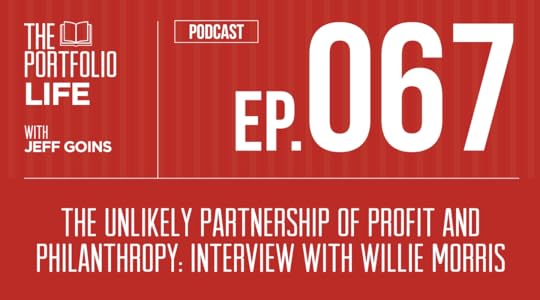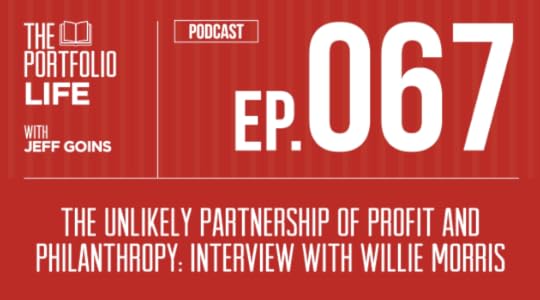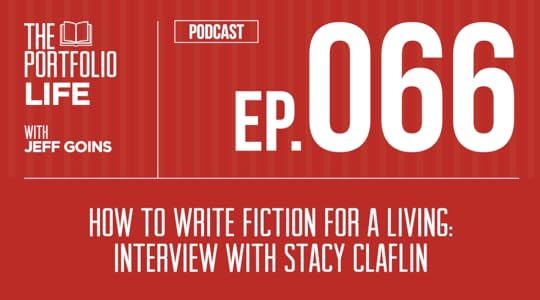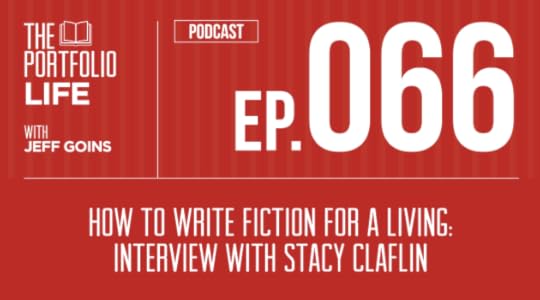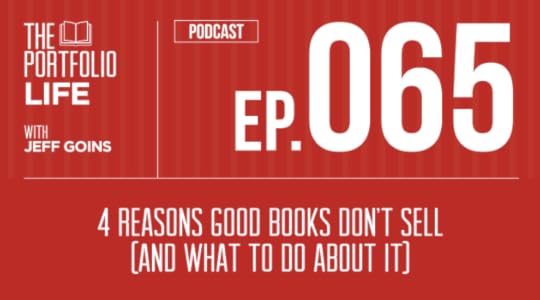Jeff Goins's Blog, page 51
August 7, 2015
067: The Unlikely Partnership of Profit and Philanthropy: Interview with Willie Morris [Podcast]
People think the rise of digital products spells doom for physical goods. In reality, the popularity of e-commerce reduces the tangible junk and makes room for artisans to surprise us.
With the pervasive use of mobile devices and growing digital platforms, people forget the romance of holding a work of art that isn’t measured in pixels. This presents a unique opportunity for luxury items and special editions to meet a new standard.
This week on The Portfolio Life, Willie Morris and I talk about building a business to do good in the world and the competitive advantage of capitalism over charity. Listen in as we discuss launching a faith-based subscription box service in partnership with a social media mogul and venture capitalist.
Listen to the podcast
To listen to the show, click the player below (If you are reading this via email, please click here).
You can also listen via iTunes or on Stitcher.
Profitable philathropy
The foundational challenge nonprofits face is fundraising. Despite a noble cause, depending on donations for daily operations is risky. A great deal of time and energy is focused on finding donors who may not be around for long. Especially when the next trendy cause hits social media.
I understand this predicament first hand as I had to raise money for my salary while working at a nonprofit. Now, as an entrepreneur, I’m financially able to do more good than ever before.
Some people think profits and philanthropy are at odds when the opposite is true. John D. Rockefeller and his colleagues believed it was their responsibility to give away the majority of their wealth. To be great at business and use it to accomplish the most good.
One of the things I find most interesting is how brands like TOMS and Faithbox are embracing this mindset and providing the opportunity for their customers to participate in a philanthropic mission.
Show highlights
In this episode, Willie and I discuss:
Willie’s journey from doctoral studies to corporate jobs and entrepreneurship
How a miscommunication over breakfast led to a meeting with Gary Vaynerchuk
Exploring the subscription box model
The unique origin of Faithbox
Facing the challenges of launching a faith-based physical product in an increasingly digital marketplace
When to accept venture capital from an investor
How corporate experience prepares entrepreneurs for success
Avoiding irrelevance and dependency on donations
The endurance of tangible goods as works of art
What the future of physical products looks like
Quotes and Takeaways
”Build a company that values more than just profit.” —Willie Morris
Successful companies grow a loyal community around their brand.
“You need to feel 100% comfortable with whoever invests in you.” —Willie Morris
There is no substitute for empathy.
Making a profit empowers you to do the most good.
Resources
Faithbox
Tribe Writers
Transcript (coming soon)
Giveaway
You could win a free annual subscription to Faithbox! Leave a comment by August 14, 2015 for your chance to win.
Do you subscribe to a monthly box? If you launched a subscription box, what would be in it? Share in the comments

067: The Unlikely Partnership of Profit and Philanthropy: Interview with Willie Morris
People think the rise of digital products spells doom for physical goods. In reality, the popularity of e-commerce reduces the tangible junk and makes room for artisans to surprise us.
With the pervasive use of mobile devices and growing digital platforms, people forget the romance of holding a work of art that isn’t measured in pixels. This presents a unique opportunity for luxury items and special editions to meet a new standard.
This week on The Portfolio Life, Willie Morris and I talk about building a business to do good in the world and the competitive advantage of capitalism over charity. Listen in as we discuss launching a faith-based subscription box service in partnership with a social media mogul and venture capitalist.
Listen to the podcast
To listen to the show, click the player below (If you are reading this via email, please click here).
You can also listen via iTunes or on Stitcher.
Profitable philathropy
The foundational challenge nonprofits face is fundraising. Despite a noble cause, depending on donations for daily operations is risky. A great deal of time and energy is focused on finding donors who may not be around for long. Especially when the next trendy cause hits social media.
I understand this predicament first hand as I had to raise money for my salary while working at a nonprofit. Now, as an entrepreneur, I’m financially able to do more good than ever before.
Some people think profits and philanthropy are at odds when the opposite is true. John D. Rockefeller and his colleagues believed it was their responsibility to give away the majority of their wealth. To be great at business and use it to accomplish the most good.
One of the things I find most interesting is how brands like TOMS and Faithbox are embracing this mindset and providing the opportunity for their customers to participate in a philanthropic mission.
Show highlights
In this episode, Willie and I discuss:
Willie’s journey from doctoral studies to corporate jobs and entrepreneurship
How a miscommunication over breakfast led to a meeting with Gary Vaynerchuk
Exploring the subscription box model
The unique origin of Faithbox
Facing the challenges of launching a faith-based physical product in an increasingly digital marketplace
When to accept venture capital from an investor
How corporate experience prepares entrepreneurs for success
Avoiding irrelevance and dependency on donations
The endurance of tangible goods as works of art
What the future of physical products looks like
Quotes and Takeaways
”Build a company that values more than just profit.” —Willie Morris
Successful companies grow a loyal community around their brand.
“You need to feel 100% comfortable with whoever invests in you.” —Willie Morris
There is no substitute for empathy.
Making a profit empowers you to do the most good.
Resources
Faithbox
Tribe Writers
Transcript (coming soon)
Giveaway
You could win a free annual subscription to Faithbox! Leave a comment by August 14, 2015 for your chance to win.
Do you subscribe to a monthly box? If you launched a subscription box, what would be in it? Share in the comments

August 6, 2015
Early Bird Registration for Tribe Writers Ends Tonight!
As you may know, my online course Tribe Writers opened this week for registration. We do this only a couple times per year. If you’re looking to build an audience and get your writing noticed (through the practical tools of blogging online marketing), don’t miss this.
Tonight, we’re closing registration for the early bird discount, which includes some massive savings and a few exclusive bonuses you won’t be able to get later. Here’s what you get if you sign up before midnight tonight:
Bonus #1: Book Launch Crash Course by Tim Grahl ($50 value)
In this course, you’ll learn everything from Tim Grahl who has helped launched numerous #1 New York Times best-selling books about what it takes to launch your book the right way.
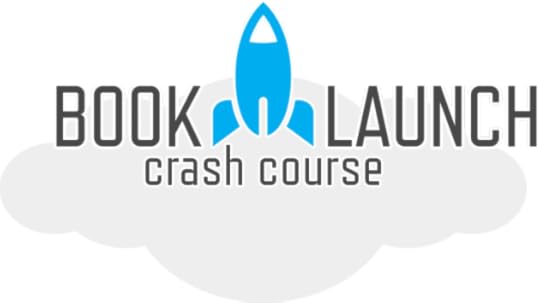
Bonus #2: Rapid List-Building Course by Bryan Harris ($225 value)
In this online membership site, you’ll get the basics on what it takes to go from 0 to 100 subscribers quickly. Bryan Harris is my go-to guy on list-building, and you won’t be disappointed with the value here.

Bonus #3: Learn Scrivener Fast Student Level by Joe Nicoletti ($127 value)
It’s no surprise I’m a big Scrivener fan. And I know of no one who is a greater expert at it than Joe Nicoletti. In this online membership program, you’ll get all the basic videos on how to get started with Scrivener and use it to create blog content, write screenplays, or work on your next book.
Of course, this is in addition to the hundreds of dollars in other bonuses you can see at tribewriters.com, so if you were waiting to join, now’s the time.
In case you’re still on the fence, here are a few reasons to join Tribe Writers now:
Because after today, the price goes up. We do this almost every launch, in fact. So if you are going to sign up eventually, you might as well do it now and save. You can always join now and go through the content later.
Because we offer a 30-day, money back guarantee. So if you want to get started, work through the content and discover that it’s not for you, you can just send me an email and I’ll give you a full refund.
Because 3000 people can’t all be wrong. That’s how many people we’ve welcomed to Tribe Writers in the past three years. And that’s the community you get access to when you join. The content, of course, is great, but the community is unmatchable. You will no longer be alone.
Also, if you join Tribe Writers Premium, you’ll get one free ticket voucher to the Tribe Conference and save $200 if you sign up before midnight on Thursday, August 6, 2015. After that deadline, the price goes up.
So what’re you waiting for?
Join Tribe Writers

August 5, 2015
The Secret to a Successful Writing Career (Is Not What You Think)
Do you want to know what the secret to a successful career in just about any field is? It’s failure. As a writer, I’ve experienced this first hand. But what I’ve discovered through the process is we often misinterpret failure.

Photo courtesy of Unsplash.com.
Most of us treat failure like an enemy, as if it’s an obstacle to be avoided. But failure, as I wrote in The Art of Work, is really a friend dressed up like an enemy. We think that when we fail, we are moving away from success, but we’re actually moving toward it — that is, if you fail in the right way.
So what’s the right way to fail?
I love telling people my current website was my ninth attempt at blogging. What happened to the other eight, you ask? Well, they were total flops. That’s right — I had to fail eight times before succeeding once. Not a great track, I know, but as it turns out, this isn’t quite so rare.
Albert Einstein worked in the patent office for the greater part of a decade before creating his first breakthrough success. Steve Jobs was fired from the company he started, launched a failed startup, and drifted from one project to the next for years before finally returning to Apple.
But of course, these men weren’t just biding their time. They weren’t waiting for the world to notice them. They were practicing. And that’s the secret to using failure as the ultimate tool to succeed.
What failure taught me about writing
It took me seven years of failure to learn a simple lesson about writing. After those years of frustration, I finally figured out why my attempts at “making it” weren’t working. Now, I see others making the same costly mistake.
We think getting our work noticed is about chasing trends or finding the right topic. I certainly did. A slave to the whims of the masses, I would pursue any idea or approach to writing that would win me some eyeballs. But the more I did this, the more I felt like my craft was dying.
I wasn’t writing from the heart, and it showed. Nobody read my stuff, and even fewer people liked it. Feeling like a fake and about to give up for good, I discovered an important truth, one I had been missing since the beginning.
One day, while sharing my frustrations with another writer, I was complaining about nobody noticing my work in spite of my hopping from one news-worthy trend to the next. And thankfully my friend put me in my place. “Jeff,” she said, “good writing isn’t about finding the right topic. It’s about finding the right voice.”
Good writing isn't about finding the right topic. It's about finding the right voice.Click To Tweet
Oh. So… I tried that.
I began writing in a way that resonated with me, which sounds a lot easier than it was. But I tried it, anyway, and was surprised by what I learned. And the more I looked around, observing the styles of best-selling authors, popular bloggers, and world-renowned comedians, the more I saw the same thing. The secret behind the world’s most successful communicators is they all have a voice, a worldview, a perspective that makes them unique, and worth following.
This paradigm shift helped me tap into the power of my own voice and gave me the confidence to share it. Suddenly, I didn’t have to be like everyone else. I could be myself and trust that someone would read my work. And it wasn’t long before people did just that. Maybe all that failure was the perfect preparation.
The truth about failure
When you are in a season of failure, one of invisibility in which the world hasn’t recognized your genius yet, the truth is you may not be failing at all. You may be laying the groundwork for the future. That was certainly the case for Albert Einstein and Steve Jobs.
During his years of working in the patent office, which was the only job he could get at the time, Einstein started a discussion group called the Olympia Academy. This group of intellectuals met regularly to discuss science and philosophy and challenged Einstein in his thinking, influencing the work that would later make him famous.
After being fired from Apple, Jobs led a small animation company called Pixar. He also launched NeXT Computer, which in spite of being funded by billionaire Ross Perot was arguably a failure, except for the fact that it created the operating system that now runs every Apple device. At Pixar, Jobs learned how to be a CEO. And at NeXT, he created the technology that would eventually save Apple from bankruptcy.
Both men were revolutionaries in their own right. They succeeded because of how they approached failure, seeing it as an opportunity the practice their skills and prepare for the next season. They weren’t dreaming of a big break. They were setting the scene for the next act.
Sadly, most writers don’t do this. They try to imitate someone else’s success, copying the strategies of someone they admire. They neglect the opportunities failure provides and chase after the dream of tomorrow instead of doing the work of today.
But what if you did something different? What if instead of waiting to be noticed, you used whatever opportunity you have today to make an impact? What if, like Einstein the nobody, you created your own network so you could start honing your craft anyway?
What if, like Jobs, you used failure as an advantage, and spent some time finding your voice, figuring out what you wanted to say and how you wanted to say it? What if you started doing the kind of work you could be proud of?
Well, then you just might be on your way to finding your tribe.
Three lessons on finding your tribe
A tribe of dedicated followers and fans is a powerful thing. This is what allows you to publish a book or start a business. It’s what can lead to that career change or the distinctive that makes your work stand out. As Seth Godin has written many times, it’s hard to succeed without one.
There are three lessons I learned from my failure as a writer that ultimately helped me succeed. Maybe they’ll help you, too:
Don’t chase trends. Write what you want to read. What resonates with you just might resonate with an audience. This is a far more secure way to approach your craft than just doing the popular thing.
Don’t try to find the right topic. Find the right voice, and let the rest of the work come. This is the secret to doing sustainable work you can be proud of that allows you to shift your focus over time (if you so desire).
Don’t just follow your passion. Find your tribe by making your work matter to others. Do the hard work of serving your audience and trust the readers will come (because they will).
Getting people to care about your work is tough. It really is. But it isn’t impossible. There is a way out of this rat race, one that allows you to not feel like a fake while still getting the attention your message deserves. And it starts with you finding your tribe.
Start building your tribe today
For the first time in seven months, my online course Tribe Writers (where we teach you how to get your writing noticed) opened this week for registration.
This only happens a couple times a year, so if you’re looking to become a better writer, build an audience, and get your work noticed, you don’t want to miss this. And if you join before midnight tomorrow (August 6), you’ll get three exclusive bonuses that won’t be available later.
Here’s what we have for you:
The Book Launch Crash Course from Tim Grahl (a $50 value)
The Rapid List-Building Course by Bryan Harris (a $225 value)
Learn Scrivener Fast Student Level by Joe Nicoletti (a $127 value)
I’m a huge fan of each of these guys and the work they do, so it’s fun to offer these to you if you sign up soon. Don’t forget: This is in addition to the hundreds of dollars in other bonuses you can see at tribewriters.com.
What’s more, if you join Tribe Writers Premium, you’ll also get one free ticket voucher to the Tribe Conference and save $200 if you sign up before 11:59 p.m. Pacific on Thursday, August 6, 2015. After that deadline, the price goes up. So if you’re on the fence, now is the time to join!
Learn More About Tribe Writers

July 31, 2015
066: How to Write Fiction for a Living: Interview with Stacy Claflin [Podcast]
Major feats seem absurd until you break them down into tangible increments. For example, writing a book feels impossible until you reduce it to a simple daily habit.
If you write just 500 words each day for a year, you end up with 182,500 words. Considering the average Harry Potter novel is roughly 127,000 words, you’re not all that different from J.K. Rowling.
This week on The Portfolio Life, prolific fiction writer Stacy Claflin and I talk about her writing process and the journey to becoming a full-time novelist. Listen in as we discuss the details of self publishing fiction and how Stacy writes a book a month.
Listen to the podcast
To listen to the show, click the player below (If you are reading this via email, please click here).
You can also listen via iTunes or on Stitcher.
Myth of the magic pill
The process of becoming a full-time writer rarely makes for good television. Each episode would feature a lone actor sitting at a desk typing for an hour. The only variety provided for viewers would be occasional sips of coffee or a bathroom break.
Exciting stuff, huh?
Writing for a living is much less romantic than Hollywood leads us to believe. In the movie Limitless, Bradley Cooper’s character takes a magic pill and cranks out a book that’s plagued him for years in a matter of hours. If only it were that easy.
It’s common to think the creative life involves ditching your day job and embracing inspiration whenever strikes. Reality, though, isn’t quite so romantic.
One of the things I found fascinating about Stacy’s story is her dedication to her craft while juggling competing priorities. She showed up every day to write while running a daycare business and homeschooling her children. She didn’t leap without a parachute — she built a bridge, one book at a time.
Show highlights
In this episode, Stacy and I discuss:
Where her creative journey began
The value of finishing a story at the right time
Discovering a connection with people through writing
Creating one of the first serialized stories distributed via email
Navigating the tension between pure creation and writing for an audience
Transitioning from a personal development blog to vampire novels
How to launch a series of fiction on Amazon
A nifty trick for avoiding writer’s block
The secret to prolific daily writing
Balancing home, work, and life while pursuing a passion
Why even fiction writers need an email list
Determining when to step into writing as a full-time vocation
Why fiction writers need a platform before they publish
Prioritizing a writing practice to create a mountain of content
Quotes and takeaways
When we create something and keep it hidden, the art is not fulfilling it’s purpose.
Don’t carbon copy what other people do. Try to imitate and iterate.
“Respect the boundaries of a genre, but try to stand out and be different from the rest.” —Stacy Claflin
Build a bridge to your dream job instead of jumping off a cliff.
Figure out what you want to write, start an outline, decide to write every day.
Resources
Stacy Claflin’s blog
Deception by Stacy Claflin
On Writing by Stephen King
The Self-Publishing Podcast
This week, we’ve re-opened the ever-popular Tribe Writers course, of which Stacy and 3000 other writers are a part. To get the attention your writing deserves, check it out.
What did you learn from this interview? Share in the comments.

066: How to Write Fiction for a Living: Interview with Stacy Claflin
Major feats seem absurd until you break them down into tangible increments. Writing your masterpiece feels impossible until you reduce it to a habit.
If you write just 500 words each day for a year, you end up with 182,500 words. Considering the average Harry Potter novel is roughly 127,000 words, you’re not all that different than J.K. Rowling.
This week on The Portfolio Life, prolific fiction writer, Stacy Claflin, and I talk about her writing process and the journey to becoming a full-time novelist. Listen in as we discuss the details of self-publishing fiction and how Stacy writes a book every month.
Listen to the podcast
To listen to the show, click the player below (If you are reading this via email, please click here).
You can also listen via iTunes or on Stitcher.
Myth of the magic pill
The process of becoming a full-time writer rarely makes for good television. Each episode would feature a lone actor sitting at a desk typing for an hour. The only variety for viewers provided by occasional sips of coffee or a bathroom break.
Writing for a living is much less romantic than Hollywood leads us to believe. In the movie Limitless, Bradley Cooper’s character takes a magic pill and cranks out a book that’s plagued him for years in a matter of hours. If only it was so easy.
It’s common to think a truly creative life involves ditching a day job and embracing inspiration whenever it happens to strike. Reality isn’t quite so romantic.
One of the things I found fascinating about Stacy’s story is her dedication to her craft while juggling competing priorities. She showed up every day to write while running a daycare business and homeschooling her children. Stacy didn’t leap off a picturesque cliff without a parachute, she built a bridge one book at a time.
Show highlights
In this episode, Stacy and I discuss:
Where her creative journey began
The value of finishing a story at the right time
Discovering a connection with people through writing
Creating one of the first serialized stories distributed via email
Navigating the tension between pure creation and writing for an audience
Transitioning from a personal development blog to vampire novels
How to launch a series of fiction on Amazon
A nifty trick for avoiding writer’s block
The secret to prolific daily writing
Balancing home, work, and life while pursuing a passion
Why even fiction writers need an email list
Determining when to step into writing as a full-time vocation
Why fiction writers need a platform before they publish
Prioritizing a writing practice to create a mountain of content
Quotes and takeaways
When we create something and keep it hidden, the art is not fulfilling it’s purpose.
Don’t carbon copy what other people do. Try to imitate and iterate.
“Respect the boundaries of a genre, but try to stand out and be different from the rest.” —Stacy Claflin
Build a bridge to your dream job instead of jumping off a cliff.
Figure out what you want to write, start an outline, decide to write every day.
Resources
Stacy Claflin’s blog
Deception by Stacy Claflin
On Writing by Stephen King
The Self-Publishing Podcast
Are you a Tribe Writer like Stacy? Are you ready to find the audience your message deserves? Share in the comments

July 28, 2015
Some Writers Get Really Mad When You Say This
I caught some flack last week for putting out a video that tells you all it takes to become a writer is to call yourself one.

Photo Credit: ohhector via Compfight cc
So let’s talk about that. Is this good advice? Is that all it really takes? Or am I making something really hard look really easy?
Well, yes, I suppose telling people all you have to do is call yourself a writer could be oversimplifying things. And of course, it opens up the possibility for more wannabe writers out there.
But I never said becoming a writer ended with calling yourself one. That’s just where it begins.
Honestly, I think the reason this advice upsets people is because of a series of limiting beliefs some writers have. But maybe I’m wrong. Maybe this is bad advice. So let’s explore the alternatives to calling yourself a writer.
1. You could “just write.”
I’m a fan of this method. I did it for years. I wrote and wrote and didn’t worry about who read my writing.
The problem with this approach, though, is it doesn’t work if you want to become a professional. Why? It gives you a place to hide. We live into the story we tell ourselves, and when we tell ourselves we are amateurs, we do the work of an amateur.
2. You could try to earn it.
One person recently told me you have to write at least four hours a day to be a writer. If you can’t do that, this person said, then you’re not a real writer.
Whoa. Really? If that’s true, then I’m out. But so is Hemingway, who famously wrote 500-1500 words every day and often felt guilty for sometimes skipping days to spend his time fishing. And so are a lot of writers.
I don’t like this approach because it lets you do the very thing many writers are apt to do — that is, beat up on yourself. But here’s the kicker: you never feel good enough. So you never arrive at your destination.
But quantity isn’t what makes a writer. What makes a writer a writer is the the work, the writing. It’s hard enough to try to get up and do that every day. I don’t need some critic telling me what I’ve done isn’t enough.
3. You could wait to be picked.
One person criticized me for calling myself a best-selling author because I had never published a hardcover and wasn’t published with one of the “big” publishers.
Sigh. This is what’s wrong with publishing right now. Many of us are still living under an old paradigm of getting picked by a gatekeeper. But there are no more gatekeepers. The only person who gets to decide if you are a writer is you.
The only person who gets to decide if you are a writer is you.Click To Tweet
Steven Pressfield once told me you become a writer “when you say you are.” I like that. It’s simple and to the point and some people don’t like it.
But those are the same people who want to keep you from ever becoming your true self. They’re the ones who want to label you and keep you thinking small. And at a certain point you just to choose to not listen to those people — or spend your life trying to satisfy them.
Here’s what you should do instead…
My advice? Become who you are. Do what you were born to do and write like you mean it.
Maybe like me, you need to first believe in yourself, even if it takes a little Jedi mind trickery, and call yourself a writer. Then start writing. One doesn’t work without the other. You need both.
This may sound like a chicken-and-egg scenario, but I believe the belief must precede the writing. Faith fuels work. Activity follows identity. You become a writer by believing you are one and living into that reality.
Maybe this isn’t for everyone, but it’s worked for me and helped a lot of other people. And for what it’s worth, I’ve seen the opposite — the view of writing as a sacred art only reserved for the social elite — do more harm than good.
If you wait for the world to give you an identity, you might be waiting a long, long time. As for me, I’d rather not give other people the keys to my calling. I’ve opted out of the system, and if you’re exhausted from trying to please the gatekeepers and critics, maybe you should, too.
This week, I’m teaching a free class on what it takes to become a professional writer this week and would love for you join me. Watch the first video here.
Sign Up for the Free Class

July 22, 2015
065: 4 Reasons Good Books Don’t Sell Anymore (and What to Do About It) [Podcast]
Children are born utterly helpless and dependent. A book is no different.
Many authors think after a book is written all the hard work is over. But writing a book is like giving birth to a baby. A baby can’t take care of itself and neither can a book. Both require supervision.
Much like parenting, the book launch process is an arduous and rewarding journey. You’ve produced this living thing, but now you’ve got to make sure it survives and thrives.
This week on The Portfolio Life, Andy and I talk about why it’s easier than ever to publish a book, but more difficult than ever to sell one. Listen in as we discuss the death of the golden age of publishing, and what it means for writers.
Listen to the podcast
To listen to the show, click the player below (If you are reading this via email, please click here).
You can also listen via iTunes or on Stitcher.
You and what army?
Back in the day, if a writer landed a contract with a publisher, they were set. All they had to do was write the book and the publisher took care of everything else.
Now, with the introduction of self-publishing and digital channels, the game has changed. Publishing houses are folding and merging. They are adapting their approach to acquiring new talent and launching books. For authors, writing a good book isn’t enough anymore.
To write a book that sells, the weight of marketing and promotion falls on the writer’s shoulders. To succeed, authors need an army.
Rome wasn’t built in a day or a month. Neither was a best-selling book launch.
Show highlights
In this episode, we discuss:
The difference between a good book and a great one
The myth many writers believe about getting published
What the end of the golden age of publishing means for writers
How to pursue your passion while considering your audience
The realistic ratio between how long it takes to write a great book and how long it takes to launch it
A fatal mistake authors make during book launches
How a writer can understand the reader’s investment in a book
Why a launch team isn’t enough to sell books
Questions an author must answer to rally an army
Bridging a marketing budget gap with magic
How to get people to share your book like crazy
Quotes and Takeaways
When you rise out of obscurity people pay attention.
Good books don’t sell anymore.
Once you finish writing a book, the work has just begun.
People buy books slowly.
It doesn’t take a team to launch a book, it takes an army.
Resources
That’s Interesting by Murray Davis
The Scientific Secrets of Shareable Content
The $100 Startup by Chris Guillebeau
The Happiness of Pursuit by Chris Guillebeau
Platform by Michael Hyatt
The Tipping Point by Malcolm Gladwell
Outliers by Malcolm Gladwell
David & Goliath by Malcolm Gladwell
Contagious by Jonah Berger
What do you need to do differently for your next book launch? How are you raising an army for your book launch? Share in the comments

July 21, 2015
How a Life Plan Illuminates Your Calling
Discovering your calling is not an epiphany but a series of intentional decisions. —The Art of Work
Dozens of books have been written over the last decade about how to discover meaningful work. While all contained nuggets of wisdom, by in large they’ve been too mystical, ethereal, or philosophical to actually be useful.
The Art of Work eliminates the mystery of finding our purpose and provides the practical “nuts and bolts” to help us get somewhere and live a life of significance.
As a business and leadership coach, I spend most of my time helping clients improve their decision-making process, and take deliberate action. Our philosophy at Building Champions is:
In order to fully live life, we first need to get clear on what matters most to us. —Laurel Emory (tweet)
Greg McKeown, in his book Essentialism: The Disciplined Pursuit of Less, says that a life of purpose and meaning comes to the person who “pauses to discern what really matters.”
The life planning process provides clarity about who and what is most important to us. Jeff speaks the truth when he says, “Finding our purpose is a path.” A life plan establishes boundary markers so we don’t venture off the path into the nonessential and end up having someone else prioritize our life for us.
As part of my doctoral dissertation, I interviewed CEOs of multi-million dollar corporations and each one of them said that making intentional decisions based on what mattered most to them was one of the major reasons for their success.
As the Millionaire Musician remarked to Jeff, success for him was “about setting a goal and then achieving it.” Nothing happens if we don’t make an intentional decision, take action, and do the necessary work to reach our goal.
The life planning process is a useful tool that guides us along this journey. A life plan helps us set a clear goal, and identify the required steps to achieve it. For some people we coach, this process led them to discover their calling. For others, it gave them permission to invest more resources on their current path and the motivation to move forward.
One client intentionally decided, through the life planning process, that she wanted her home to be a place where her teenage kids and their friends felt comfortable hanging out. When tragedy struck their town and a teenager was killed, our client and her husband were the people these teens went to for comfort because they’d grown to trust them and enjoyed the welcoming environment.
Another client offers grief therapy by using her horses. But she works full-time in a corporate job and hasn’t been able to commit as much time to serving others. As a result of creating a life plan, she is looking for another job that will provide enough flexibility so she can spend more time helping people in need of healing.
At Building Champions, regularly help our clients gain clarity on what matters most to them. As a result, they live more fully and are more present in the work and relationships that align with their calling.
Each of us has meaningful work that we were uniquely created and called to do. —Laurel Emory (tweet)
What’s in your life plan? Are you living to your potential? What do you want to change? Share in the comments

July 20, 2015
The Surprising Path to Becoming a Professional Writer (+ a Free Class!)
You’d like to write a book some day. You’d love to get your words out there. Heck, you wouldn’t mind even getting paid to share them with the world.

Photo Credit: yksin via Compfight cc
But that’ll never happen, you say. This is just a hobby, something I do for fun. I don’t have what it takes to turn pro. And that, in the words of Yoda, is why you fail.
Before you know it, you’re back to using words like someday and wannabe. You’re back to thinking small, like an amateur. And slowly, your dream dies before it ever had the chance to live.
So what if you stopped thinking like that?
What if all it took to become a writer was to start thinking one? What if writing wasn’t this thing only the elite got to do, but a craft anyone could tackle?
Most of us are content to look at the opportunities others have been given and lament what we’ve lost. We would rather find an excuse for our inaction than a solution to our problems. I know, because I used to do this (and still sometimes do).
The simple shift that made me a writer
For years, I thought of my writing as merely a hobby, something I did on the side. I never would have called myself a writer and certainly wouldn’t have seriously tried to publish anything.
But one day, I met someone who taught me how this thinking was preventing me from the success I wanted. He said to me, “Jeff, you don’t have to want to be a writer. You are a writer. You just need to write.”
If you’ve been reading the blog for awhile, you know those simple words — “you are a writer, you just need to write” — truly did change my life. But maybe you missed the importance behind them.
I don’t want you to get me wrong. You can’t just think your way into a new life. You have to work at it, and it won’t be easy. This is not as woo-woo as it sounds. It’s hard to change the way you think.
But here’s the thing: once I started thinking differently about who I really was — a writer, not a wannabe — the activity that followed didn’t feel forced. In a way, I had to believe I could be a writer before I became one. And maybe that’s not such a crazy thing, after all.
Better questions, not more answers
Every day, I meet people who want to become writers. They have a book in them and a love for words they just want to let out. They don’t have any delusions of making a million dollars or getting on the Today Show to promote their book. They just want to be heard.
I wanted the same thing — not fame or riches, just an opportunity to say something that people would listen to and hopefully appreciate.
Now, after publishing four books and getting the opportunity to speak to hundreds of thousands of people every month, I am amazed at how important that simple mindset shift was for me. In order for me or you or anyone of us to do the real work of a writer, we have to stop looking for answers and instead learn to ask better questions.
Often the answers to our biggest problems is learning to ask better questions.Click To Tweet
Introducing a new challenge
In my latest video series, “The Three Questions Every Writer Must Ask,” I’ll walk you through the burning questions I hear most writers ask and how to go about answering them. Think of it as a free class on what it takes to start a career as a writer.
This is a series I’ve taught to thousands of writers, and people have always walked away with tons of ideas and next steps on how to take their writing career to the next level. I think you’ll love it, too.
In this series, you’ll learn:
The small but destructive words that are hurting you more than you realize
The way to get people to start taking you and your work seriously
Why what you write about isn’t as important as you think
How to build an audience of dedicated readers
What it really takes to turn pro and get paid to publish your work
The series will only run for a limited time, so don’t miss it. As soon as you sign up, you’ll get access to the first video, and the next one will come soon after. The best part? This is completely free (I feel a little like Oprah right now). You’ll also get a free eBook to read in between video lessons.
Click here to sign up for the free video series and challenge and claim your free eBook.


